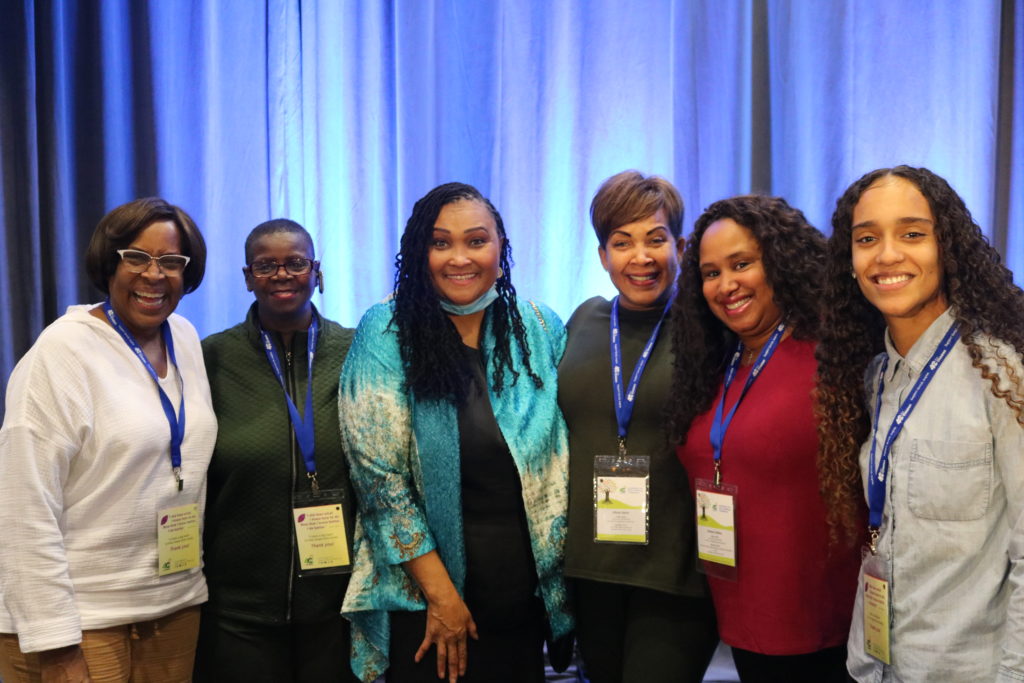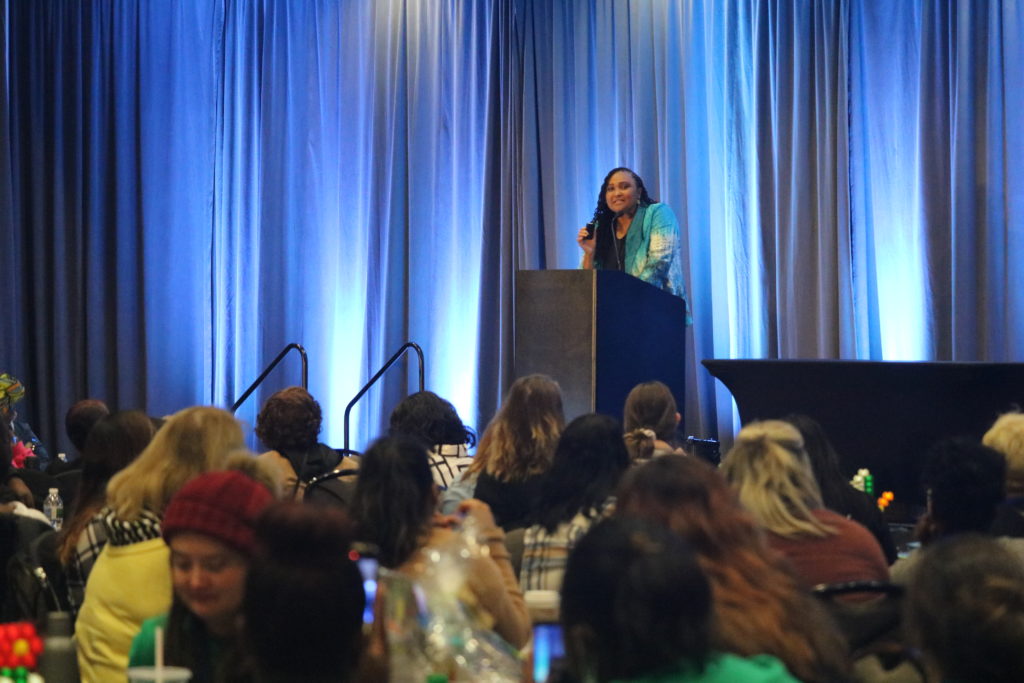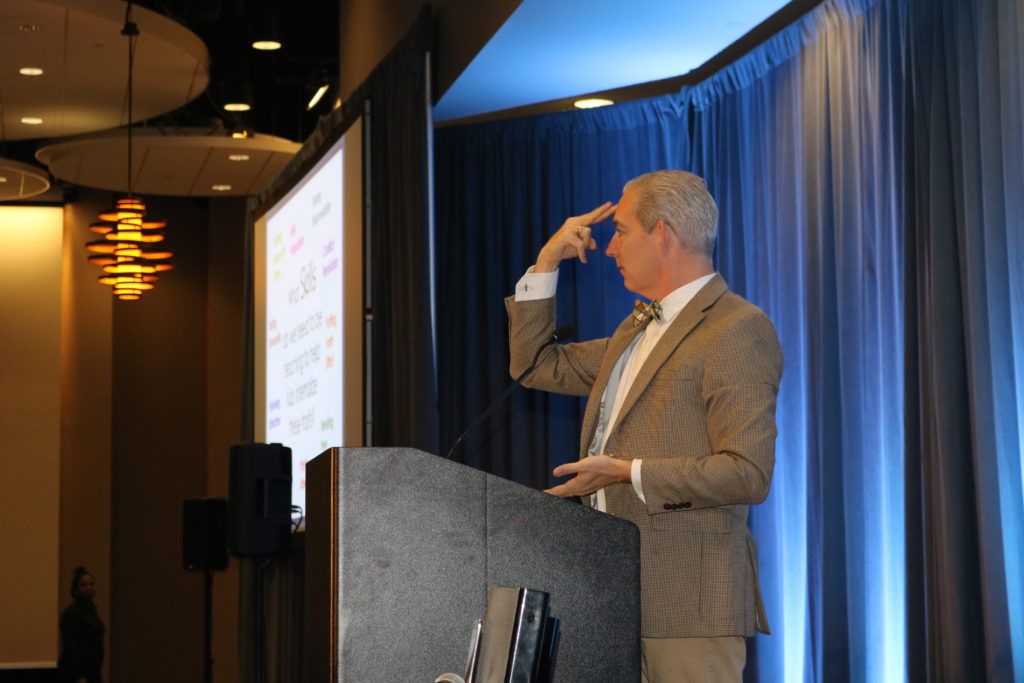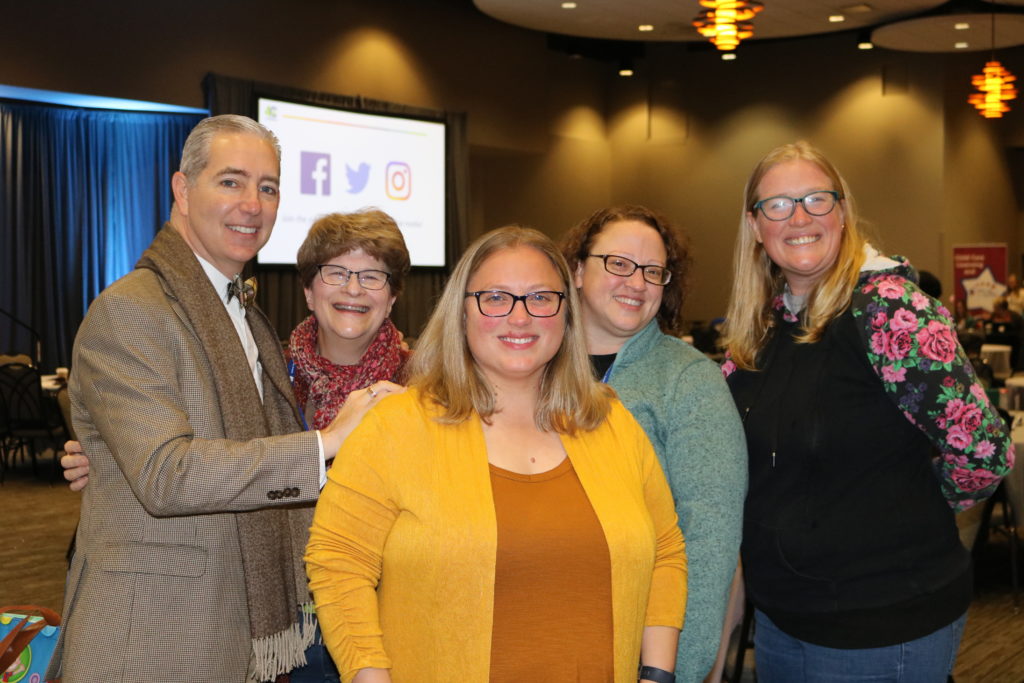More than 450 child care providers attended the 4C for Children Leadership and Early Education Conference in October and were inspired and motivated by keynote speakers Maryum Ali and Dan St. Romain. The speakers shared stories and tips about social-emotional well-being and positive ways to assess children’s developmental needs.
Find out more about our next conference by signing up for our provider bi-monthly emails.

Maryum Ali
As the eldest daughter of Muhammad Ali, Maryum shared stories with the conference attendees about her and her father’s shared passion for helping others and their love for children. She caught up with 4C for Children after her presentation to discuss more about her connection with child care providers, her father’s influence and her experience in Cincinnati.
Question: How did you use your own childhood experience to make a connection with child care providers attending the conference?
Answer: It sounds so simple, but I think that the images I saw and the role models that I saw impacted me the most. [The role models] came from people who understood who they were and loved themselves. To show real love for people, care and compassion, you have to love yourself. It can be stressful working with kids. You have all the different personalities and the different energies coming from different households. You may not know what’s going on. To be patient and calm enough to keep that compassion consistent is not an easy thing.
The early childhood educators are role models and mentors in this field and are always being cognizant of that. If you’re struggling with something, work on yourself… If you’re struggling with something, you have to develop your own social and emotional skills as you’re working with these kids.
Question: What would your father, Muhammad Ali, say if he was listening to your presentation?
Answer: He was always proud of the work I was doing. There’s a tape recording of me as a little kid and he says, ‘Maryum what’s your purpose in life? Everything has a purpose in life – the stars, the moon. What’s your purpose?’ As a little kid, I said ‘I want to help people.’
He would be happy I was living my purpose and the purpose of providing service–lifting people up and empowering them to be the best people they could be. He loved children, especially anything to do with the empowerment and uplifting of kids. He would just say ‘I’m glad you’re living your purpose, I’m glad you’re still doing what you love and it’s fulfilling work. You’re connecting with people to try and make the world a better place.’


Question: What’s one message you hope our audience takes away from your presentation?
Answer: The key word is empathy because the word is loaded. It’s encompassing care, compassion and understanding. That word encompasses trying to look at the world through another person’s lens and it entails patience. To show true empathy, you have to be patient enough to get to know people. Empathy is where I would start. That’s why I started the presentation with my dad and the empathic experiences I witnessed that inspired me to want to do the work that I do.
I remember in my junior year of high school, my teacher said ‘Did you see the paper?’ I said no. ’It said your father is the most recognized man in the world.’ I’m like ‘Huh?’ And there it was on the paper. For me it didn’t match who he was as a person. To have that kind of fame, it’s really hard to stay humble and be a humanitarian. That was powerful to me. He was an empathic person. It comes from a spiritual space that all people are created equal in the eyes of God. We all have different traditions, experiences, hardships and challenges, but a person is a beautiful soul. The person is not the hardships, right? You could work with anyone if you can understand that.
Question: What have the conversations been like with our attendees?
Answer: Cincinnati was so close to Louisville, so I knew I would meet someone that had a connection to my dad and I did – her name was Donna Turnbow Williams. Her brother Melvin (Turnbow) was my dad’s sparring partner. I don’t know when but probably before he became a professional. And he knocked him down. He was a big dude. [Donna] showed me a picture of him. I’m like, ‘Oh, I could see that.’ He looked kind of Joe Lewis, “The Brown Bomber.” That was cool meeting her. I knew I would get at least one story.

Dan St. Romain
Dan found a deep calling to work with children when he finished his master’s degree and was working in Chicago. For the last 18 years, Romain has worked in an early childhood center with 400 three- to five-year-old children teaching social skills. The joy and wonder he found in children fuels his passion to speak around the country.
4C for Children had the opportunity to ask Romain questions about the conference and his experience.
Question: Why did you choose to share your passion for early childhood education at the 4C conference?
Answer: I’ve worked at all (education) levels and what I’ve found is early childhood is where it all starts. Obviously if we invest in early childhood, it’s going to pay off in big ways. Other things I love about early childhood is the joy and wonder. Older kids are a little more engrained into a different world. To little kids you say, ’OK, we are going to go outside,’ and they say, ‘I love outside! It’s the best thing ever.’ The joy and wonder are just amazing when working with little children. If I can inspire teachers to work with that joy, then it can pay off dividends.
Question: Where do you feel child care is going?
Answer: The bottom line is times have changed. All these child care providers, teachers and caregivers have an inclination to raise kids how we were raised. The problem is times have changed. Technology is impacting development. The developing brain is different because of role models and factors in the world. When you ask me where it is, I’m going to say we need to back up and say ‘What do we want and what is our end game for kids?’ We have a lot of caregivers who are very well intentioned and get into power struggles with kids. When we are filtering everything on how we were raised, it’s just a different world. In today’s society, we are using the same interventions, but we aren’t getting the same outcome. I hear that from parents and caregivers. They are just exhausted.
I think we need more than a tweak in how we deal with kids, but an overhaul. What we are doing right now is keeping the systems running, but so many caregivers are just exhausted at the end of the day. In terms of where we are going, we have a lot of hope, but we need to reanalyze how we work with kids. We need to work with kids through the lens of understanding where they are and where they are coming from in the current situation of our society.
Question: Have you worked with anyone in Southwest Ohio before? Answer: I’m working with a group through an online course. I’m working with 350 teachers around the country and in Canada on my work. There are eight teachers from Our Lady of Grace in Cincinnati who have been working with me for the year. I was online with them the other day and they were excited to see me here.
Answer: I’m working with a group through an online course. I’m working with 350 teachers around the country and in Canada on my work. There are eight teachers from Our Lady of Grace in Cincinnati who have been working with me for the year. I was online with them the other day and they were excited to see me here.
Question: What is one key message you wanted the conference participants to take away from your presentation?
Answer: It’s really about seeing the needs kids have in all areas, so we can build on that. All kids have assets, but there are things that kids need to grow up healthy and well adjusted. I want people to look beyond the short-term behavior and look towards our long-term goal of healthy and well-adjusted. Ask people how many of you know an adult who is very smart, but have no people skills and don’t know how to get along with others. So that’s why when we are working with young children, we have to look beyond cognition. At least a lot of times in the educational and child care arena, we think children need to know letters and sounds as opposed to this child needs to not lick his friends…I really want them to walk away with the bigger picture of how he or she needs to behave versus we need to get this done. So, it’s looking at the big picture of healthy development.